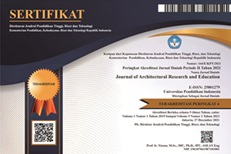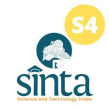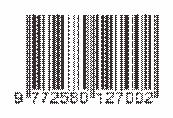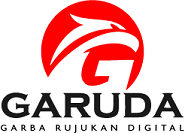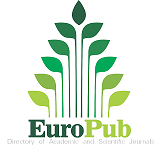THE EFFECT OF EDUCATIONAL GAME-BASED TEAM GAMES TOURNAMENT (TGT) LEARNING MODEL ON STUDENT LEARNING OUTCOMES OF CLASS X BUILDING MODELING AND INFORMATION DESIGN (DPIB) 3 PUBLIC VOCATIONAL HIGH SCHOOL (SMK) 1 BALONGAN INDRAMAYU, WEST JAVA
Abstract
This research is motivated by the low level of learning outcomes of students who do not meet the Minimum Completeness Criteria (KKM). The results of the pre-research found that students felt bored with expository learning techniques, had uneven motivation, interest, and enthusiasm for learning, tended to be passive during learning, and lacked the creation of mutually constructive relationships between high achieving students and those who did not. Therefore, it is necessary to conduct research on "The Influence of Educational Game-Based Team Games Tournament Learning Models on Learning Outcomes in the Basics of Modeling and Building Information Subjects". This study aims to determine the application of the Team Games Tournament learning model with Wordwall media and its effect on improving student learning outcomes in the Basics of Modeling and Building Information Design subjects. This research is useful for solving problems by applying appropriate learning models according to the learning objectives and characteristics of students. This research used an experimental method in the form of Quasi Experimental with Non Randomized Control Group Design conducted at SMKN 1 Balongan, Indramayu. The population used was all class X DPIB expertise program students. The sample was determined using purposive sampling techniques. The samples to be studied were class X DPIB 2 and X DPIB 3. The data collection technique used was test instruments and observation sheets. The results of this study showed an increase in learning outcomes in class X DPIB 3 by 47%, while the average increase in learning outcomes through the use of expository models in class X DPIB 2 was only 16%. Thus, it can be seen that the experimental class X DPIB 3 experienced an average increase in learning outcomes which was higher than the control class X DPIB 2.
Keywords - Team Games Tournament, Wordwall, student learning outcomes.
Keywords
Full Text:
PDFReferences
Ahmadiyanto. (2016). MENINGKATKAN AKTIVITAS DAN HASIL BELAJAR SISWA MENGGUNAKAN MEDIA PEMBELAJARAN KO-RUF-SI (KOTAK HURUF EDUKASI) BERBASIS WORD SQUARE PADA MATERI KEDAULATAN RAKYAT DAN SISTEM PEMERINTAHAN DI INDONESIA KELAS VIIIC SMP NEGERI 1 LAMPIHONG TAHUN PELAJARAN 2014/2015. Jurnal Pendidikan Kewarganegaraan, 6(2), 980–993.
Arikunto, S. (2009). Dasar-Dasar Evaluasi Pendidikan. Bumi Aksara.
Aryani, N., & Wahyuni, M. (2021). TEORI BELAJAR DAN IMPLIKASINYA DALAM PEMBELAJARAN. Bintang Pustaka Madani.
Gagné, R. M. (1970). The Condition of Learning. Holt, Rinehart and Winston.
Hake, R. (1999). Analyzing Change/Gain Scores. AREA-D American Education Research Association’s.
Huda, M. (2011). Cooperative learning, metode, teknik, struktur dan model terapan. Pustaka Pelajar.
Johnson, E. B. (2011). CTL (Contextual Teaching & Learning). Kaifa.
Mahmudi, I., Athoillah, Muh. Z., Wicaksono, E. B., & Kusuma, A. R. (2022). Taksonomi Hasil Belajar Menurut Benyamin S. Bloom. Jurnal Multidisiplin Madani, 2(9), 3507–3514.
Doi: https://doi.org/10.55927/mudima.v2i9.1132
Majid, M., Azizurahman, A., & Rahman, A. (2022). Faktor-Faktor yang Mempengaruhi Hasil Belajar Mata Pelajaran Pendidikan Agama Islam. Jurnal Agama dan Pendidikan Islam, 14(1), 12–20.
Mardiyan, R. (2012). PENINGKATKAN KEAKTIFAN DAN HASIL BELAJAR SISWA DALAM PEMBELAJARAN AKUNTANSI MATERI JURNAL PENYESUAIAN PADA SISWA KELAS XI IPS 3 SMA NEGERI 3 BUKITTINGGI DENGAN METODE BERMAIN PERAN (ROLE PLAYING). Pakar Pendidikan, 10(2), 151–162.
Nafiati, D. A. (2021). Revisi taksonomi Bloom: Kognitif, afektif, dan psikomotorik. Humanika, 21(2), 151–172.
Doi: https://doi.org/10.21831/hum.v21i2.29252
Nurhasanah, S., & Sobandi, A. (2016). MINAT BELAJAR SEBAGAI DETERMINAN HASIL BELAJAR SISWA. Jurnal Pendidikan Manajemen Perkantoran, 1(1), 128–135.
Pondaag, R., Pardanus, R., & Togas, P. (2021). PENGARUH MINAT DAN MOTIVASI BELAJAR TERHADAP HASIL BELAJAR KKPI SISWA SMK. Jurnal Pendidikan Teknologi Informasi dan Komunikasi, 1(3), 284–296.
Purnamasari, S., Rahmanita, F., Soffiatun, S., Kurniawan, W., & Afriliani, F. (2021). BERMAIN BERSAMA PENGETAHUAN PESERTA DIDIK MELALUI MEDIA PEMBELAJARAN BERBASIS GAME ONLINE WORD WALL. Diakses dari www.wordwall.net
Purwanto, N. (2007). Psikologi Pendidikan. Remaja Rosdakarya.
Sari, P. M., & Yarza, H. N. (2021). PELATIHAN PENGGUNAAN APLIKASI QUIZIZZDAN WORDWALLPADA PEMBELAJARAN IPABAGI GURU-GURUSDIT AL-KAHFI. Selaparang Jurnal Pengabdian Masyarakat Berkemajuan, 4(2), 195–199.
Shoimin, A. (2019). 68 model pembelajaran inovatif dalam kurikulum 2013. Ar-Ruzz Media.
Slavin, R. E. (2015). Cooperative learning. Nusamedia.
Sugiyono. (2017). METODE PENELITIAN: Kuantitatif, Kualitatif, dan R&D. ALFABETA.
Sulistio, H., & Haryanti, N. (2022). MODEL PEMBELAJARAN KOOPERATIF (COOPERATIVE LEARNING MODEL) . Eureka Media Aksara.
Sulistyawati, W., & Trinuryono, S. (2022). ANALISIS (DESKRIPTIF KUANTITATIF) MOTIVASI BELAJAR SISWA DENGAN MODEL BLENDED LEARNING DI MASA PANDEMI COVID19.
Sumardi. (2020). Teknik Pengukuran Dan Penilaian Hasil Belajar. Deepublish.
Taniredja, T., Faridli, E. F., & Harminatro, S. (2011). MODEL-MODEL PEMBELAJARAN INOVATIF. ALFABETA.
Vries, D. D. L. (1980). Team games tournament: The Team Learning Approach Educational Technology.
Widhiarso, & Wahyu. (2017). Mengakomodasi Efek Metode dalam Pengujian Validitas Konstruk Melalui Analisis Faktor Konfirmatori.
Widiyanto, J. (2010). SPSS For Windows untuk analisis data statistik dan penelitian. Bp-Fkip Ums.
Widodo, & Widayanti, L. (2013). PENINGKATAN AKTIVITAS BELAJAR DAN HASIL BELAJAR SISWA DENGAN METODE PROBLEM BASED LEARNING PADA SISWA KELAS VIIA MTs NEGERI DONOMULYO KULON PROGO TAHUN PELAJARAN 2012/2013 . Jurnal Fisika Indonesia, 17(49), 32–35.
Yahya, A., & Wahidah Bakri, N. (2020). Pembelajaran kooperatif tipe rotating trio exchange untuk meningkatkan aktivitas dan hasil belajar matematika siswa. Jurnal Analisa, 6(1), 69–79. Doi: http://journal.uinsgd.ac.id/index.php/analisa/index
Yulisa, B., Setyaningtyas, N., Hartutik, H., & Wuriningsih. (2023). Efektivitas Metode Teams Games Tournamet (TGT) Berbantuan Modul Terhadap Sikap Toleransi Siswa 2(2).
Yusup, F. (2018). UJI VALIDITAS DAN RELIABILITAS INSTRUMEN PENELITIAN KUANTITATIF. Juni, 7(1), 17–23.
DOI: https://doi.org/10.17509/jare.v5i2.62722
Refbacks
- There are currently no refbacks.
Copyright (c) 2024 Journal of Architectural Research and Education

This work is licensed under a Creative Commons Attribution-NonCommercial-ShareAlike 4.0 International License.
Statcounter

This work is licensed under a Creative Commons Attribution-ShareAlike 4.0 International License.


